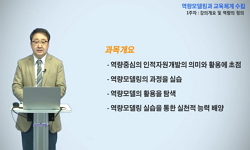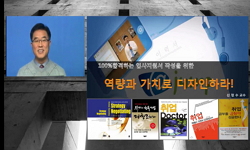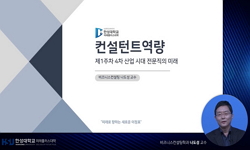The purpose of this study was to develop and validate future teacher competencies diagnosis tools required for pre-service teachers. In this study, the hypothesis model was established by hierarchizing basic competency and job competency in three dime...
http://chineseinput.net/에서 pinyin(병음)방식으로 중국어를 변환할 수 있습니다.
변환된 중국어를 복사하여 사용하시면 됩니다.
- 中文 을 입력하시려면 zhongwen을 입력하시고 space를누르시면됩니다.
- 北京 을 입력하시려면 beijing을 입력하시고 space를 누르시면 됩니다.

예비교사에게 요구되는 미래 교사역량 진단도구 개발 및 타당화 = Development and Validation of Future Teacher Competency Diagnostic Scale for Pre-service Teachers
한글로보기https://www.riss.kr/link?id=A106587607
- 저자
- 발행기관
- 학술지명
- 권호사항
-
발행연도
2020
-
작성언어
Korean
-
주제어
예비교사 ; 역량 ; 미래 교사역량 ; 진단도구 ; 타당화 ; Pre-service teachers ; Competency ; Future teacher competency ; Diagnostic scale ; Validation
-
등재정보
KCI등재
-
자료형태
학술저널
-
수록면
331-339(9쪽)
-
KCI 피인용횟수
1
- DOI식별코드
- 제공처
-
0
상세조회 -
0
다운로드
부가정보
다국어 초록 (Multilingual Abstract)
The purpose of this study was to develop and validate future teacher competencies diagnosis tools required for pre-service teachers. In this study, the hypothesis model was established by hierarchizing basic competency and job competency in three dimensions such as knowledge, practice, and personality as teachers' competencies required in future society. Based on this hypothesis model, 54 preliminary questions were developed, and competencies diagnosis test was conducted for 237 pre-service teachers in J area, Korea. The results of this study are as follows: First, as a result of this study, a total of 53 questions were extracted, including 18 questions with 6 factors in the knowledge dimension, 17 questions with 6 factors in the practice dimension, and 18 questions with 6 factors in the personality dimension. Second, the goodness-of-fit of future teacher competencies diagnosis model required was verified, and convergence and discriminant validity were verified. The results of this study were discussed. Finally, the implications and suggestions for further research were presented.
국문 초록 (Abstract)
본 연구는 예비교사에게 요구되는 미래 교사역량 진단도구를 개발하고 타당화하는 것을 그 목적으로 하였다. 본 연구에서 미래 교사역량으로 지식, 실천, 인성 등 3차원에서 각각 기초역량...
본 연구는 예비교사에게 요구되는 미래 교사역량 진단도구를 개발하고 타당화하는 것을 그 목적으로 하였다. 본 연구에서 미래 교사역량으로 지식, 실천, 인성 등 3차원에서 각각 기초역량과 직무역량으로 위계화하여 가설모형을 설정하였다. 본 가설모형을 바탕으로 54개의 예비문항을 개발하였으며, J지역 237명의 예비교사를 대상으로 역량 진단검사를 실시하였다. 본 연구의 결과는 다음과 같다: 첫째, 본 연구의 결과 미래 교사역량은 지식 차원 6개 요인 18개 문항, 실천 차원 6개 요인 17개 문항, 인성 차원 6개 요인 18개 문항 등 총 53개 문항이 도출되었다. 둘째, 미래 교사역량 진단 모형의 적합성은 비교적 만족할 만한 수준이었고, 집중타당성과 판별타당성이 검증되었다. 본 연구의 결과에 따라 논의하였으며, 마지막으로 본 연구의 시사점 및 후속연구 제언을 제시하였다.
참고문헌 (Reference)
1 백종남, "통합교육교사의 디지털 테크놀로지 자기효능감 연구" 사범대학 부설 교육연구소 39 (39): 19-32, 2019
2 백종남, "통합교육교사 테크놀로지-교수내용지식(TPACK) 모형의 타당성 검증" 한국특수교육학회 53 (53): 165-182, 2018
3 박남기, "제4차 산업혁명기의 교육개혁 새패러다임 탐색" 한국교육학회 55 (55): 211-240, 2017
4 권귀염, "제4차 산업혁명 시대의 교육과유아교사의 역할" 학습자중심교과교육학회 18 (18): 47-72, 2018
5 김혜리, "유아교사의 대인관계 스트레스가 교사 효능감에 미치는 영향 : 유아교사 행복감의 매개효과를 중심으로" 한국영유아교원교육학회 21 (21): 77-103, 2017
6 최인숙, "예비유아교사의 공감능력과 대인관계 유능성이 교사효능감에 미치는 영향" 한국산학기술학회 19 (19): 454-462, 2018
7 노명숙, "영유아교사 자질에 대한 교사·학부모 인식과 대인관계능력 연구" 사단법인 인문사회과학기술융합학회 9 (9): 11-22, 2019
8 류광모, "스마트교육 기반 디지털교과서 활용 실천 교사 역량모델 개발" 학습자중심교과교육학회 17 (17): 231-252, 2017
9 김홍겸, "미래교육에서의 인간 교사와 인공지능 교사의 상호보완적 관계에 대한 소고" 교육연구소 24 (24): 189-207, 2018
10 홍선주, "미래 학교 교사의 교수학습 역량 모델링" 교육연구소 25 (25): 365-388, 2019
1 백종남, "통합교육교사의 디지털 테크놀로지 자기효능감 연구" 사범대학 부설 교육연구소 39 (39): 19-32, 2019
2 백종남, "통합교육교사 테크놀로지-교수내용지식(TPACK) 모형의 타당성 검증" 한국특수교육학회 53 (53): 165-182, 2018
3 박남기, "제4차 산업혁명기의 교육개혁 새패러다임 탐색" 한국교육학회 55 (55): 211-240, 2017
4 권귀염, "제4차 산업혁명 시대의 교육과유아교사의 역할" 학습자중심교과교육학회 18 (18): 47-72, 2018
5 김혜리, "유아교사의 대인관계 스트레스가 교사 효능감에 미치는 영향 : 유아교사 행복감의 매개효과를 중심으로" 한국영유아교원교육학회 21 (21): 77-103, 2017
6 최인숙, "예비유아교사의 공감능력과 대인관계 유능성이 교사효능감에 미치는 영향" 한국산학기술학회 19 (19): 454-462, 2018
7 노명숙, "영유아교사 자질에 대한 교사·학부모 인식과 대인관계능력 연구" 사단법인 인문사회과학기술융합학회 9 (9): 11-22, 2019
8 류광모, "스마트교육 기반 디지털교과서 활용 실천 교사 역량모델 개발" 학습자중심교과교육학회 17 (17): 231-252, 2017
9 김홍겸, "미래교육에서의 인간 교사와 인공지능 교사의 상호보완적 관계에 대한 소고" 교육연구소 24 (24): 189-207, 2018
10 홍선주, "미래 학교 교사의 교수학습 역량 모델링" 교육연구소 25 (25): 365-388, 2019
11 이영희, "교육 개혁의 방향에 관한 학생·학부모·교원 및 교육정책전문가들의 인식 조사 연구" 한국열린교육학회 27 (27): 75-103, 2019
12 성병창, "교사의 핵심역량에 대한 교육공동체의 인식 조사" 한국수산해양교육학회 21 (21): 78-95, 2009
13 J. K. Tak, "Understanding of Psychological Test-Development and Evaluation Method" Hak Ji Sa 2009
14 N. J. Baek, "Understanding and Design of Competency-based Curriculum" Educational Academy 2016
15 S. B. Moon, "Understanding and Application of Structural Equation Modeling" Hak Ji Sa 2010
16 L. S. Shulman., "Those who understand : Knowledge growth in teaching" 15 (15): 4-14, 1986
17 K. Schwab, "The fourth industrial revolution" Currency 2017
18 Ministry of Education, "The Direction and Strategy of Mid- and Long-Term Education Policy in Response to Knowledge and Information Society"
19 S. Hong, "Testing configural, metric, scalar and latent mean invariance across genders in sociotropy and autonomy using non-western sample" 63 (63): 636-654, 2003
20 R. J. Krumsvik, "Teacher educators' digital competence" 58 (58): 269-280, 2014
21 S. Naidu, "Supporting learning with creative instructional designs" Learner Support in Open, Distance and Online Learning Environments 109-116, 2004
22 K. R. Murphy, "Psychological testing : Principles and applications" PrenticeHall 1991
23 A. W. Parsons, "Professional development to promote teacher adaptability" 55 (55): 250-258, 2016
24 R. B. Kline, "Principles and Practice of Structural Equation Modeling" Guilford Press 2011
25 Y. Zhao., "Preparing globally competent teachers : A new imperative for teacher education" 61 (61): 422-431, 2010
26 J. F. Hair, "Multivariate data analysis" Prentice hall 2006
27 T. D. Little., "Longitudinal structural equation modeling" Guilford press 2013
28 C. Fadel, "Four-dimensional education" Center for Curriculum Redesign 2015
29 C. Fornell, "Evaluating structural equation models with unobservable variables and measurement error" 18 (18): 39-50, 1981
30 M. J. Kim, "Early Childhood Teacher’s Perception about Future" 7 (7): 25-43, 2017
31 L. T. Hu, "Cutoff criteria for fit indexes in covariance structure analysis : Conventional criteria versus new alternatives" 6 (6): 1-55, 1999
32 K. Y. Jin, "Construct Validity of the Role and Teaching Competency of Future Teachers" Soongsil University 2018
33 S. Kerka, "Competency-based education and training"
34 S. H. Hong, "Basic Workshop Textbooks of Structural Equation Model" University of California 2000
35 S. C. Ryoo, "An Analysis of the Key Competencies of the Future Human Resources in the 4th Industrial Revolution Era" Research Institute for HRD Policy 2019
36 M. W. Browne, "Alternative Ways of Assessing Model Fit" 154 : 136-136, 1993
37 남상선, "4차 산업혁명시대 인재상에 대한 교사의 인식유형 연구: 교육에서 추구하는 역량의 담론을 중심으로" 한국주관성연구학회 (47) : 119-144, 2019
38 임종헌, "4차 산업혁명사회에서 교육의 방향과 교원의 역량에 관한 탐색적 연구" 한국교육개발원 44 (44): 5-32, 2017
39 S. Y. Park, "2030 Discussion on the Reform of the Teacher Training System for the Establishment of the Education System: Theoretical Basis for the Reform of the Teacher Training System" 1-45, 2019
동일학술지(권/호) 다른 논문
-
WRIST TRUE PA와 LATERAL 검사 시 경사보조도구의 유용성 분석
- 한국융합학회
- 전상현
- 2020
- KCI등재
-
한일 인기 유튜브 콘텐츠의 특징-운영 주체와 콘텐츠 분야별 데이터 비교분석-
- 한국융합학회
- 성윤아
- 2020
- KCI등재
-
- 한국융합학회
- 이재혁
- 2020
- KCI등재
-
- 한국융합학회
- 이은주
- 2020
- KCI등재
분석정보
인용정보 인용지수 설명보기
학술지 이력
| 연월일 | 이력구분 | 이력상세 | 등재구분 |
|---|---|---|---|
| 2025 | 평가예정 | 신규평가 신청대상 (신규평가) | |
| 2022-06-01 | 평가 | 등재학술지 취소 | |
| 2019-01-01 | 평가 | 등재학술지 유지 (계속평가) |  |
| 2016-01-01 | 평가 | 등재학술지 선정 (계속평가) |  |
| 2014-01-01 | 평가 | 등재후보학술지 선정 (신규평가) |  |
학술지 인용정보
| 기준연도 | WOS-KCI 통합IF(2년) | KCIF(2년) | KCIF(3년) |
|---|---|---|---|
| 2016 | 5.85 | 5.85 | 0 |
| KCIF(4년) | KCIF(5년) | 중심성지수(3년) | 즉시성지수 |
| 0 | 0 | 0 | 0.76 |




 ScienceON
ScienceON eArticle
eArticle






